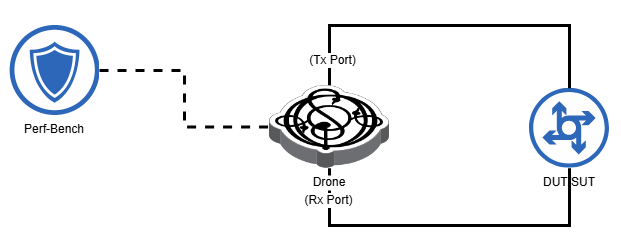Perf-Bench (RFC 2544)¶
Ostinato Perf-Bench is an automated test suite for RFC 2544.
You need docker to run Ostinato Perf-Bench.
Test Topology¶

PerfBench acts as a controller in the Ostinato Architecture and therefore can be run on a different host or on the same host running the drone. In case of the latter specify the tester device as localhost or 127.0.0.1in the test config YAML (see below).
Single Tx/Rx port with remote loopback is also supported.
How to Run¶
Create the test config YAML file perfbench.yml . A sample is shown below -
tester:
# Specify the ostinato-agent (aka drone) details
device:
host: tg-drone
description: 'Linux 1G drones'
tx_port: 'enp0s8'
rx_port: 'enp0s9'
# Specify TX/RX IP and Gateway IP for the tester tx/rx_ports
# If the DUT is directly connected to the tester, the gateway IPs should
# be configured on the DUT
tx_ip: '198.18.1.2'
tx_gateway: '198.18.1.1'
rx_ip: '198.19.1.2'
rx_gateway: '198.19.1.1'
To run the Perf-Bench container, use the shell script -
$ ./perfbench.sh [optional params]
If running on Windows, use perfbench.bat instead.
Use -h to see the list of available options and parameters
At the end of the run, a PDF report is generated.
Layer 2 DUT or back-to-back loopback topology?
Configure the tx_ip and rx_ip in the same subnet to avoid ARP/NDP errors. Here's an example -
tester:
. . .
tx_ip: '198.18.1.2'
tx_gateway: '198.18.1.3'
rx_ip: '198.19.1.3'
rx_gateway: '198.19.1.2'
Single Tx/Rx port with Remote Loopback¶

To test a single port remote loopback topology as shown above, you should set up perfbench.yml as follows -
tester.device.tx_portandtester.device.rx_portshould be set to same valuetester.tx_ipMUST be specified - this will be used as the source IP in the generated test traffictester.rx_ipMUST be specified - this will be used as the destination IP in the generated test traffic. Even if the remote port does not have an IP address assigned and does the loopback at layer 2, a dummy IP must still be specifiedtester.[rx/tx]_gatewayMUST be specified but are don't care and not usedtester.remote_mac, if specified, will be used as the destination Mac in the generated test traffic; otherwise, a random Mac will be used. This mac is expected to be of the remote port
Test Report¶
The RFC 2544 test results are available as a PDF report after the tests finish. Here's a sample test report -
Supported RFC 2544 Tests¶
| RFC Section | RFC Test Name | Supported |
|---|---|---|
| 26.1 | Throughput | ✅ |
| 26.2 | Latency | ✅ |
| 26.3 | Frame Loss Rate | ✅ |
| 26.4 | Back-to-Back Frames | ❌ |
| 26.5 | System Recovery | ❌ |
| 26.6 | Reset | ❌ |